New York: The city where Donald Trump hates being hated
- Published
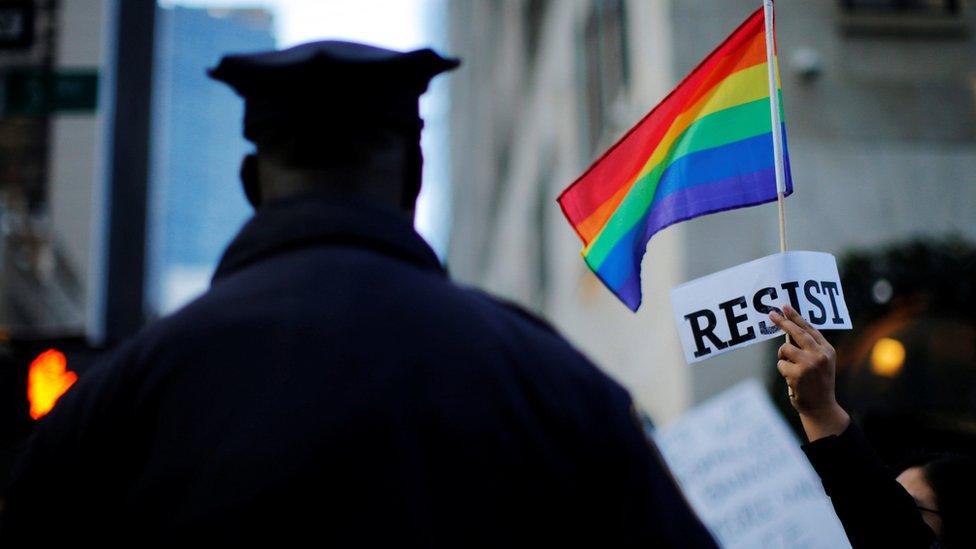
After a year of being greeted by fawning crowds in the American heartland, Donald Trump appears to be struggling with the hostility that now surrounds him in New York City.
Outside Trump Tower, you don't see many people wearing Make America Great Again baseball caps or hear them chanting "build a wall!"
Despite boasting he could turn the Empire State red, Hillary Clinton won in a landslide. In New York City, she took 79% of the vote.
Of the city's five boroughs, Trump took Staten Island, a blue-collar stronghold, but was beaten badly in the other four. In Manhattan, his long-time home, nine out of 10 voters supported Hillary Clinton.
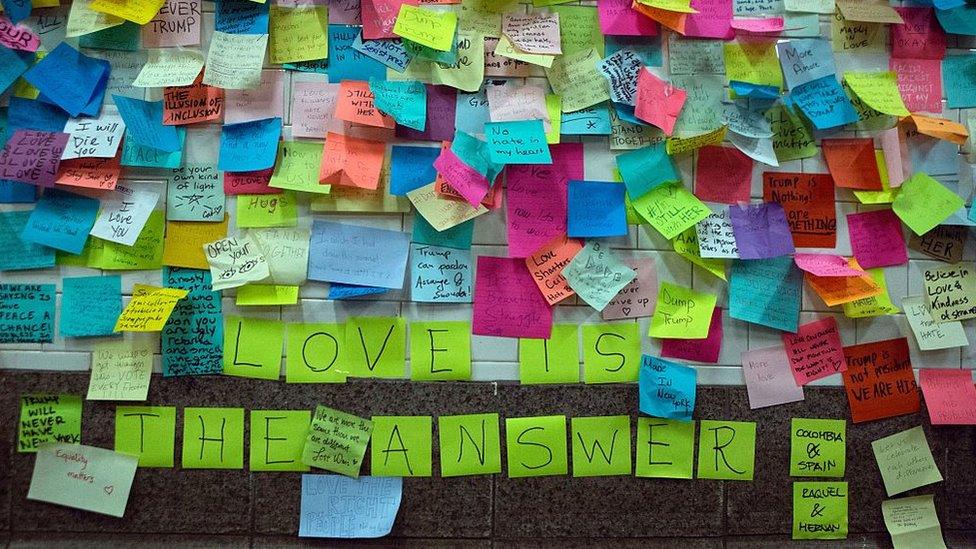
New Yorkers have voiced their displeasure with a Big Apple mix of in-your-face boisterousness and creative flair.
Not only have there been large and vocal demonstrations, but also more subtle forms of dissent, like the Post-it protest at Union Square subway station, where an entire underpass has become a multi-coloured collage of mainly anti-Trump invective.
Last week, residents at apartment buildings on the Upper West Side adorned with the Trump brand successfully agitated to have those five offending capital letters removed.
Trump's name removed from NYC buildings
Since his unexpected win, Manhattan has taken on the feel of a real-life Gotham, with the billionaire cast by his many detractors as an evil super-villain.
In his eponymous skyscraper he resides, tweeting maniacally, as protesters swirl angrily below fearful that he poses a mortal threat to their city and their planet.
Trump Tower also looks more and more like a gilded cage. Only twice since election night has the billionaire left its Louis XIV-inspired confines.
While he boasted during the election that he could shoot someone on Fifth Avenue and not lose voters, he has not stepped foot onto its sidewalks as president-elect. Now Fifth Avenue is lined with heavily armed police to prevent people from harming him.
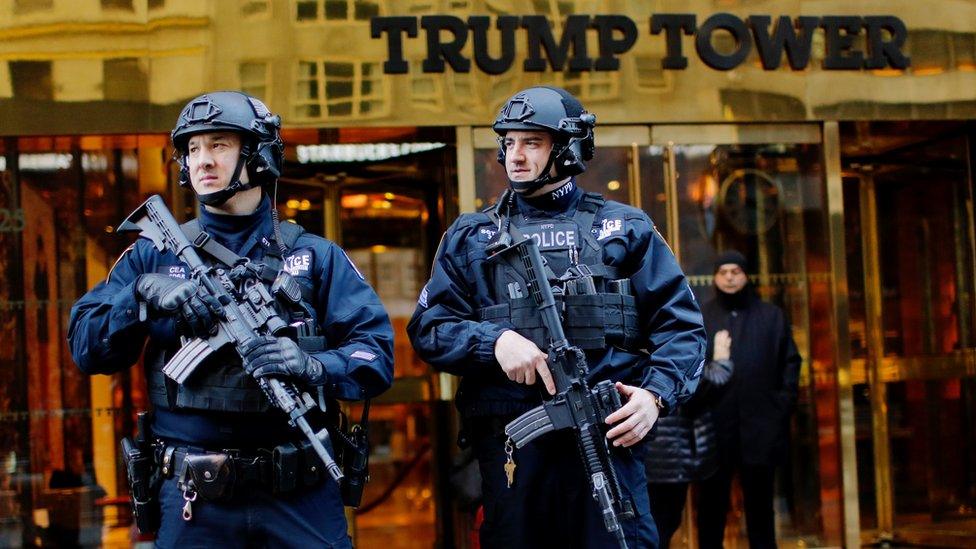
Tellingly, most of his tweet-storms since election day have been aimed at Big Apple targets.
First off, it was the protesters themselves, whom he initially claimed were professional agitators and sore losers. Then came the New York Times, for what he claimed was its inaccurate reporting about the chaos within the transition.
Next in the cross-hairs were the cast of Hamilton, Broadway's hottest show, for its curtain call plea directed at Vice-President Mike Pence to respect the rights of all Americans.
Finally it was Saturday Night Live, a show billed as being "live from New York" which has always fed off the late-night non-conformism of this city.
Nothing lays bare Donald Trump's thin skin quite like criticism from his hometown.
This was noticeable as well during the campaign. In the summer, Trump lashed out at "Little Michael Bloomberg," after the former Mayor of New York City called him a fraud at the Democratic convention. "I'm a New Yorker, and I know a con when I see one," said Bloomberg.
In February, the billionaire also went after the New York Daily News, along with its owner Mort Zuckerman, after the tabloid likened him to the Batman villain, The Joker.
"Dopey Mort Zuckerman, owner of the worthless @NYDailyNews, has a major inferiority complex," harrumphed Trump. "Paper will close soon!"
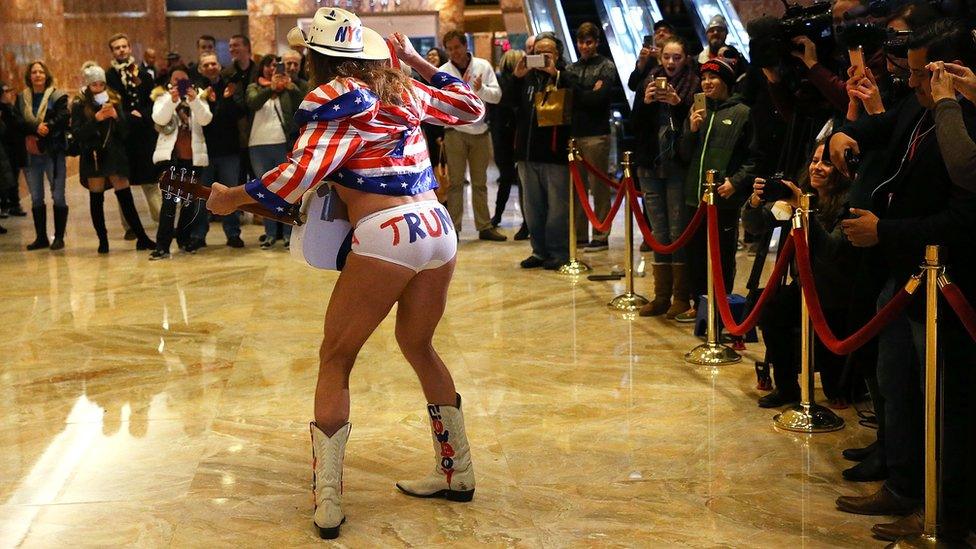
The Naked Cowboy, an iconic New York figure, is one of Trump's few supporters in Manhattan
Only this morning, Trump renewed his online trolling of the New York Times, firing off three Tweets after cancelling a meeting with its executives and editors. "Perhaps" a new meeting would be set up, he wrote, but, "In the meantime they continue to cover me inaccurately and with a nasty tone!"
What appears to have angered him is a story published by the New York Times, external raising questions about his business conflicts of interests, specifically at a British wind farm.
It was also the story that prompted Trump to suggest that Nigel Farage should become the UK ambassador in Washington.
Trump, who critics claim is a narcissist, feeds off adulation, but he receives little of that in Manhattan. The city's super-rich club has long regarded him as a vulgar self-publicist with questionable business acumen and, by their standards, a small bank balance.
Trump has never mustered the requisite wealth or displayed the requisite level of civic-minded altruism to join an elite whose surnames are found on hospitals, academic institutes and art galleries, rather than residential apartment buildings.
After spending much of the past year or so watching and travelling with Donald Trump, I've been struck by how his physical demeanour changes when he appears in public in New York City. Not in the atrium of Trump Tower, his personal fiefdom, where his incendiary rhetoric ricochets off the marble walls, but rather when he steps outside that self-congratulatory echo chamber.
Two episodes come to my mind.
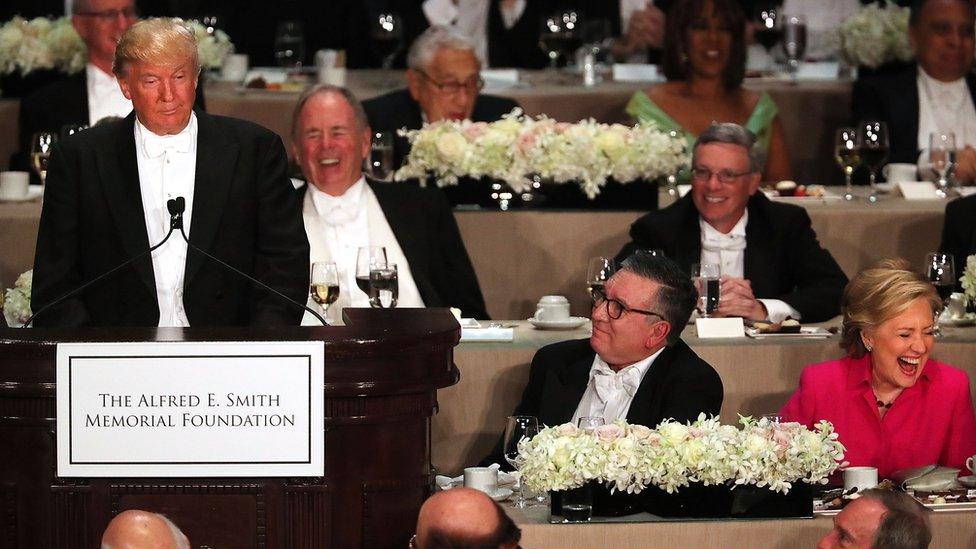
The first was when he attended the Al Smith dinner in the final weeks of the campaign, the event where candidates are supposed to make gentle fun of each other and themselves.
Faced with a hostile crowd of New York's white-tied elite, who booed parts of his speech, Trump seemed almost sheepish. The catcalls of rich New Yorkers seemed especially wounding, and it was the first time during the campaign when he looked like he had been cowed.
Likewise on election day, when he cast his ballot at a polling station in Manhattan, he seemed to recoil at being booed by a crowd outside. "New York hates you!" shouted one heckler. As he cast his ballot, there was none of the I-own-the-room showmanship and braggadocio that were the hallmark of his rally appearances in the south, in the Rust Belt, in Florida. Again, he seemed humbled by hometown hostility.
Much of New York has rejected Donald Trump because Donald Trump's candidacy seemed to reject the idea of New York.
To so many of its residents, this city is synonymous with multiculturalism, tolerance, religious freedom and globalism. Just ride the subway.
Though its welcoming tradition is often romanticised - Ellis Island was a brutal entry point for millions of new arrivals - it has nonetheless been a gateway for immigrants drawn to this country by the rich promise of the American dream.
In the eyes of many progressive-minded New Yorkers, Donald Trump's campaign was primarily about hate rather than hope.
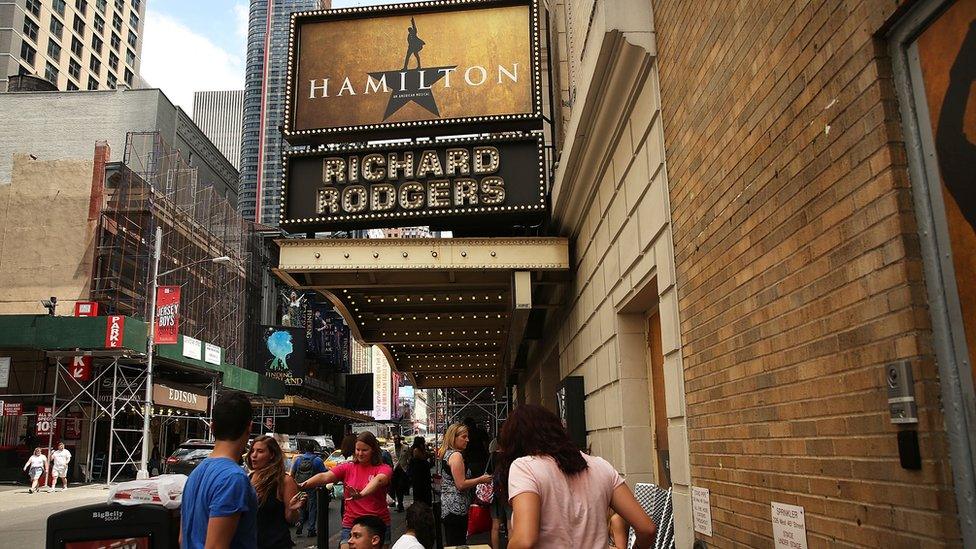
It explains why the iconic symbol of this city, the Statue of Liberty, has been used as a weapon against him by so many cartoonists.
After the release of the Access Hollywood tape, a cartoon in Rolling Stone depicted Trump molesting Lady Liberty. Another showed Lady Liberty behind an office desk being told "You're fired."
The Economist's cartoonist Kal showed the statue repelling the billionaire with an anguished face and out-stretched arm. "Come on Babe!" says the cartoon incarnation of Trump. "Give your new boss a kiss!"
During the Republican primaries, Senator Ted Cruz of Texas tried to torpedo Trump by saying he had New York values, which was code, among other things, for being soft on abortion and supportive of gay rights.
But it is precisely because the Trump presidency appears to pose a threat to New York values that so many people here are taking to the streets, some of whom have never before protested in their lives.
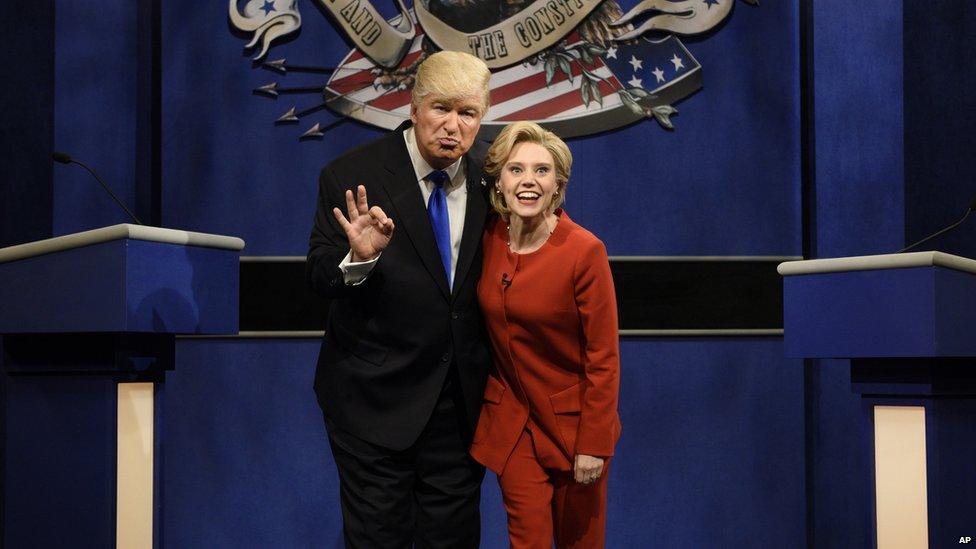
Alec Baldwin and Kate McKinnon as Donald Trump and Hilary Clinton
The great anthem of this city, belted out in karaoke bars the world over, posits that if you can make it here, you can make it anywhere. But Donald Trump's success flies in the face of what might be called the Sinatra Doctrine.
Politically he has made it elsewhere, but if New York truly were a city-state - a small island off the north-east coast of America, as some of its residents sometimes prefer to think of it - the billionaire would have been buried in a landslide.
Donald Trump may be about to become the most powerful individual on the planet, but to many in his home city he is persona non grata.